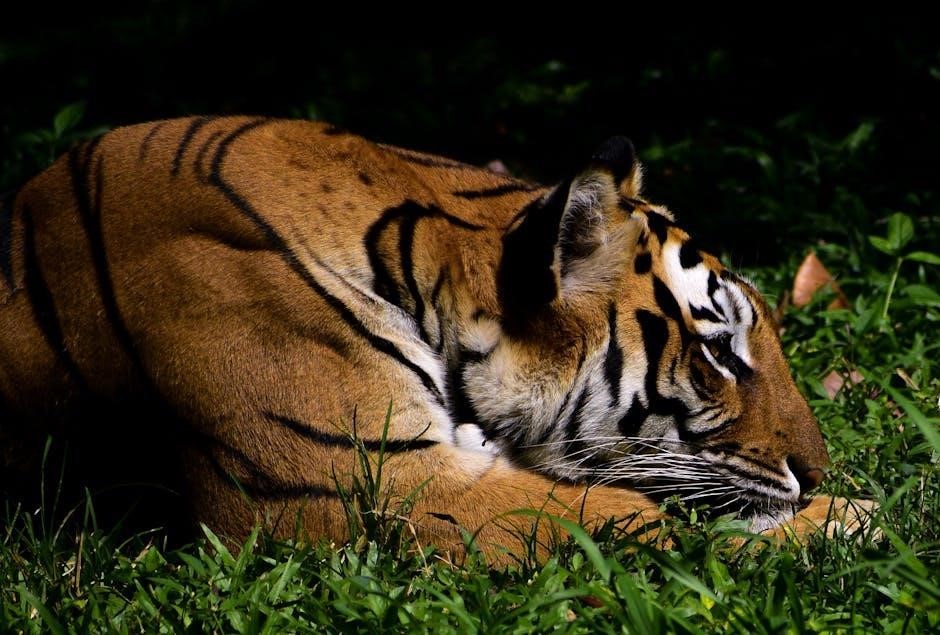Battle Hymn of the Tiger Mother PDF: A Comprehensive Guide
Embark on an exploration of Amy Chua’s controversial memoir! This comprehensive guide delves into the core themes and parenting styles․ It will examine the cultural expectations, emotional tolls, and debates surrounding this influential work, making you able to read Battle Hymn now!
Amy Chua’s “Battle Hymn of the Tiger Mother” ignited a global discussion on parenting styles․ It particularly contrasted Eastern and Western approaches․ This memoir offers an intimate look into Chua’s experiences raising her two daughters, Sophia and Louisa․ She did this with strict Chinese parenting techniques․
The book quickly popularized the term “tiger mother,” representing a parenting style characterized by high expectations and rigorous discipline․ Chua’s narrative challenges conventional Western parenting norms․ They often prioritize emotional well-being and individual autonomy․ The book’s release sparked widespread debate and controversy․ Many people questioned the effectiveness and potential consequences of such demanding methods․
“Battle Hymn of the Tiger Mother” is more than just a personal story․ It is a thought-provoking exploration of cultural differences, the pursuit of excellence, and the complexities of family dynamics․ Chua’s candid and often humorous writing invites readers to reflect on their own beliefs about parenting, success, and the balance between discipline and freedom․ It is a book that continues to provoke discussion and inspire introspection․
Amy Chua and the Tiger Mother Concept
Amy Chua, a Yale Law School professor, introduced the “tiger mother” concept․ She did this through her memoir, “Battle Hymn of the Tiger Mother”․ This term describes a strict parenting style․ It is often associated with traditional Chinese upbringing․ Chua’s approach emphasizes high academic achievement and rigorous discipline․ She expects her children to excel in all areas, particularly in academics and music․
The tiger mother concept involves intense pressure on children to succeed․ Chua’s methods include strict rules, demanding practice schedules, and limited leisure activities․ She believes that this approach fosters resilience, determination, and ultimately, success․ However, her methods have also faced criticism․ Many people question the potential emotional toll and the lack of autonomy for children raised in this manner․
Chua’s personal experiences and beliefs shaped her tiger mother philosophy․ As a second-generation Chinese American, she drew upon her own upbringing․ She also contrasted it with Western parenting styles, which often prioritize a child’s emotional well-being․ The tiger mother concept has become a cultural phenomenon․ It has sparked debates about effective parenting, cultural differences, and the definition of success․
“Battle Hymn of the Tiger Mother” explores several key themes․ The clash between Eastern and Western parenting styles is central․ Amy Chua advocates for a strict, Chinese-influenced approach, while contrasting it with more permissive Western methods․ The book delves into the pressure to achieve academic and musical excellence․ Chua demands perfection from her daughters, pushing them to excel in piano and violin․
Cultural expectations play a significant role․ Chua’s Chinese heritage shapes her parenting beliefs, emphasizing discipline and hard work․ The book examines the emotional toll of tiger parenting․ It portrays the stress and potential resentment experienced by children under intense pressure․ Family dynamics are also explored․ The relationships between Chua, her husband, and her daughters are central to the narrative․
The definition of success is another key theme․ Chua challenges Western notions of prioritizing happiness over achievement; The book also examines the sacrifices required for excellence․ It considers whether the rewards justify the emotional and personal costs․ Ultimately, “Battle Hymn of the Tiger Mother” prompts reflection on parenting philosophies․ It asks readers to consider their own values and priorities when raising children․
Parenting Styles: Eastern vs․ Western

“Battle Hymn of the Tiger Mother” vividly contrasts Eastern and Western parenting styles․ Eastern parenting, as exemplified by Amy Chua, emphasizes strict discipline, high expectations, and a focus on academic and musical achievement․ This approach often involves rigorous practice schedules, limited leisure activities, and a strong emphasis on obedience․ Mistakes are seen as opportunities for improvement, and criticism is used to motivate children to excel․
In contrast, Western parenting styles typically prioritize a child’s emotional well-being, self-esteem, and individual autonomy․ Western parents often encourage exploration, creativity, and a balanced lifestyle․ Praise and positive reinforcement are common tools, and the focus is on fostering a child’s interests and talents․ Mistakes are viewed as learning experiences, and parents often strive to protect their children from failure and disappointment․
Chua’s book challenges the Western emphasis on praise and self-esteem, arguing that it can lead to complacency and a lack of resilience․ She believes that strict discipline and high expectations are necessary to unlock a child’s full potential․ However, the book also acknowledges the potential drawbacks of tiger parenting, including emotional strain and strained family relationships․ The comparison forces readers to evaluate their own beliefs․

The Debate Surrounding Tiger Parenting
Amy Chua’s “Battle Hymn of the Tiger Mother” ignited a widespread debate about the merits and drawbacks of tiger parenting․ Proponents argue that it fosters discipline, resilience, and high achievement, enabling children to reach their full potential․ They believe that strict expectations and rigorous training instill a strong work ethic and prepare children for success in a competitive world․ Some view it as a culturally appropriate method that reflects the values and traditions of certain communities․
However, critics argue that tiger parenting can be emotionally damaging, leading to anxiety, depression, and a strained parent-child relationship․ They believe that it stifles creativity, individuality, and the development of intrinsic motivation․ The pressure to excel can create a fear of failure, hindering a child’s ability to take risks and explore their own interests․ Critics also point out that it may not be suitable for all children, as some may thrive in a more supportive and autonomy-promoting environment․
The debate also touches upon the role of cultural expectations and the balance between discipline and freedom in raising children․ It invites discussions about the definition of success and whether it should be solely based on academic or professional achievements․ This conversation prompts parents to reflect on their own values and priorities when making decisions about their children’s upbringing․
Academic and Musical Excellence in the Book
“Battle Hymn of the Tiger Mother” places significant emphasis on achieving both academic and musical excellence․ Amy Chua’s parenting approach revolves around pushing her daughters, Sophia and Louisa, to excel in these areas, believing that it cultivates discipline, focus, and a strong work ethic․ The book details the rigorous practice schedules, high expectations, and unwavering commitment to achieving top performance in piano and violin․
Chua’s methods involve intensive tutoring, strict adherence to practice routines, and a relentless pursuit of perfection․ She believes that through consistent effort and unwavering dedication, her daughters can unlock their full potential and achieve exceptional results․ The book highlights the sacrifices made by both Chua and her daughters to maintain this level of excellence, including foregoing social activities and leisure time․
The narrative explores the challenges and rewards of striving for such high standards․ It showcases the achievements and accolades earned by Sophia and Louisa, as well as the emotional toll and family dynamics that arise from the constant pressure to excel․ The book raises questions about the true cost of academic and musical excellence and whether it is worth the sacrifices made along the way․ It prompts readers to consider the balance between pushing children to achieve their potential and nurturing their overall well-being․
Sophia and Louisa: The Daughters’ Experiences

“Battle Hymn of the Tiger Mother” offers a compelling look at the contrasting experiences of Amy Chua’s daughters, Sophia and Louisa, under her strict parenting․ Sophia, the elder daughter, largely embraces her mother’s expectations, thriving in the rigorous environment of piano practice and academic achievement․ She finds success and recognition through her dedication, embodying the “Tiger Mother” ideal of disciplined excellence․
Louisa, on the other hand, grapples with her mother’s demanding approach․ She experiences moments of rebellion and struggles to reconcile her personal desires with the pressure to conform to Chua’s expectations․ Louisa’s journey becomes a pivotal point in the book, highlighting the potential negative consequences of extreme parenting and the importance of individual expression․
The book explores how each daughter navigates the challenges and rewards of their upbringing․ Sophia’s story showcases the potential benefits of discipline and hard work, while Louisa’s experiences reveal the emotional toll and the need for balance․ Through their individual journeys, “Battle Hymn of the Tiger Mother” delves into themes of identity, personal fulfillment, and the complex dynamics within a family shaped by cultural expectations and differing personalities․ It prompts readers to consider the impact of parenting styles on children’s development and well-being․
Criticism and Controversy of Chua’s Methods
Amy Chua’s parenting methods, as depicted in “Battle Hymn of the Tiger Mother,” have sparked considerable criticism and controversy․ Many critics argue that her strict, demanding approach can be emotionally damaging to children, potentially leading to anxiety, depression, and a strained parent-child relationship․ The emphasis on academic and musical excellence, often at the expense of other activities and personal well-being, is seen as a form of pressure that can stifle creativity and individuality․
Critics also point out that Chua’s methods may not be universally applicable or effective․ What works for one child may not work for another, and a rigid, one-size-fits-all approach can be detrimental․ Furthermore, some argue that Chua’s methods are rooted in cultural stereotypes and may not be appropriate or desirable in a Western context․
The controversy surrounding “Battle Hymn of the Tiger Mother” has raised important questions about the balance between discipline and freedom, the role of parents in shaping their children’s lives, and the definition of success․ It has also sparked a broader debate about cultural differences in parenting styles and the potential impact of those styles on children’s emotional and psychological development․ The book’s reception highlights the complexities and sensitivities surrounding parenting and the diverse perspectives on what constitutes effective and healthy child-rearing practices․
The Role of Cultural Expectations
“Battle Hymn of the Tiger Mother” vividly illustrates the significant role that cultural expectations play in shaping parenting styles․ Amy Chua’s strict approach is deeply rooted in traditional Chinese values that prioritize academic achievement, discipline, and respect for elders․ These values often contrast sharply with Western parenting norms, which tend to emphasize individuality, self-esteem, and a more permissive approach to discipline․
The book highlights how cultural expectations can create immense pressure on both parents and children․ Chua’s relentless pursuit of excellence for her daughters is driven, in part, by a desire to uphold these cultural values and ensure their success in a competitive world․ However, this pressure can also lead to conflict and resentment, as children may struggle to meet their parents’ expectations or feel stifled by their rigid approach․
“Battle Hymn of the Tiger Mother” prompts readers to consider the extent to which their own parenting styles are influenced by cultural norms and expectations․ It also raises questions about the potential benefits and drawbacks of different cultural approaches to parenting and the importance of finding a balance between cultural tradition and individual needs․ The book encourages a critical examination of the role of culture in shaping our beliefs about what constitutes good parenting and successful child-rearing․
Emotional Toll and Family Dynamics
“Battle Hymn of the Tiger Mother” doesn’t shy away from showcasing the emotional toll that Amy Chua’s strict parenting takes on her daughters and, ultimately, on the family dynamics․ The relentless pressure to excel academically and musically creates a high-stress environment, leading to moments of tension, conflict, and resentment․ Sophia and Louisa, while achieving remarkable feats, grapple with the weight of their mother’s expectations, impacting their emotional well-being․
The book reveals how Chua’s methods strain the mother-daughter relationships, particularly as Louisa begins to resist her mother’s control․ This defiance leads to a pivotal moment of realization for Chua, prompting her to re-evaluate her approach and acknowledge the potential negative consequences of extreme parenting․ The emotional complexity in the family is palpable, as readers witness moments of love, pride, disappointment, and vulnerability․
“Battle Hymn of the Tiger Mother” serves as a reminder of the importance of emotional well-being in parenting and the potential damage that can be inflicted by prioritizing achievement over emotional connection․ It underscores the need for parents to be attuned to their children’s emotional needs and to foster a supportive and loving environment where children feel valued for who they are, not just for what they achieve․ The book encourages readers to consider the long-term emotional impact of their parenting choices and to strive for a balance between discipline and nurturing․
Redefining Success and Happiness
“Battle Hymn of the Tiger Mother” compels readers to confront conventional definitions of success and happiness․ Amy Chua’s initial emphasis on academic and musical excellence challenges the notion that achievement alone equates to fulfillment․ The book subtly guides us to consider if societal standards truly align with individual aspirations, questioning whether external validation outweighs personal contentment․
As the narrative unfolds, it becomes apparent that Chua’s rigid expectations may not resonate with her daughters’ intrinsic desires․ The memoir sparks a vital dialogue on the importance of personal agency, urging readers to contemplate the delicate balance between striving for greatness and nurturing genuine happiness․ The journey reveals that success is multifaceted and subjective, differing from person to person․
Chua’s emotional growth, alongside her daughters’, emphasizes finding equilibrium between ambition and well-being․ “Battle Hymn of the Tiger Mother” prompts introspection: What constitutes a fulfilling life? Can success exist without emotional contentment? It suggests that achievement and personal satisfaction are interconnected․ The book ultimately challenges us to redefine success on our own terms, prioritizing happiness and emotional health alongside accomplishments, fostering a balanced and meaningful existence․

Impact on Readers and Parenting Philosophies
“Battle Hymn of the Tiger Mother” has profoundly impacted readers and sparked widespread discussions about parenting philosophies․ The memoir serves as a compelling case study, prompting parents, educators, and anyone interested in child development to re-evaluate their beliefs and approaches․ Amy Chua’s candid portrayal of her strict methods has resonated with diverse audiences, stirring introspection and debate about effective parenting․
The book challenges conventional wisdom, forcing readers to examine their cultural biases and consider alternative perspectives․ It encourages parents to question their motivations and priorities, prompting them to reflect on the long-term consequences of their choices․ Chua’s experiences offer valuable insights into the complexities of raising children in a rapidly changing world, where traditional values often clash with modern ideals․
Ultimately, “Battle Hymn of the Tiger Mother” prompts a deeper understanding of the intersections between culture, parenting, and ethics․ By sharing her personal journey, Chua invites readers to engage in a critical dialogue about the meaning of success, the role of discipline, and the importance of fostering emotional well-being in children․ The book’s lasting impact lies in its ability to inspire reflection and encourage a more nuanced approach to parenting․
Whether one admires Chua’s relentless pursuit of excellence or questions her methods, the insights gleaned from the narrative inspire introspection and discussion regarding parenting styles․ The book prompts readers to examine their values, consider the emotional impact of their choices, and redefine their understanding of success․ It encourages a more nuanced approach to raising children, emphasizing the importance of balance, communication, and individual agency․
Overall, “Battle Hymn of the Tiger Mother” earns a strong recommendation for readers ready to engage with challenging topics in parenting and personal growth․ It is a valuable resource for those seeking to understand the complexities of raising children in a diverse and ever-changing world, sparking meaningful conversations and encouraging a more reflective approach to parenting․